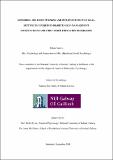| dc.description.abstract | Background. The treatment of diabetes consists of ongoing medical care and continuous self-management. Sub-optimal levels of diabetic control are commonly detected in people with diabetes. Therefore, Healthcare Professionals (HCPs) should aim to inform, educate and support people with diabetes on a continuous basis. ‘Collaborative goal-setting with patients’ has been identified as a HCP priority behaviour for diabetes research. Goal-setting techniques are widely recommended for diabetes self-management support. However, evidence is lacking regarding the effectiveness and implementation of goal-setting techniques in a diabetes context.
Aim: This research aimed to explore the effectiveness and implementation of goal-setting techniques in diabetes self-management interventions and to explore the implementation of goal-setting techniques in the ‘Dose Adjustment for Normal Eating’ programme (DAFNE), a prominent Type 1 Diabetes Self-Management Education (DSME) programme.
Methods. A combination of quantitative and qualitative methods was utilised. In study 1, a systematic review and meta-analysis was conducted to identify an evidence base related to goal-setting interventions targeting diabetes outcomes. Study 2 explored how goal-setting is currently implemented in healthcare by assessing the active content and fidelity of delivery of the goal-setting component of DAFNE. A descriptive and observational design was used in which content from the manual of DAFNE’s goal-setting component was specified in terms of Behaviour Change Techniques (BCTs) and fidelity was assessed by comparing manual specified BCTs, with corresponding observations of DAFNE sessions. Study 3 utilised a qualitative design to explore DAFNE educators’ (HCPs) perspectives on the implementation and operationalisation
of goal-setting in DAFNE and DSME programmes. Themes were identified through an inductive thematic analysis.
Findings. The systematic review found some evidence suggesting that goal-setting interventions have a positive effect on blood glucose levels in people with diabetes. The content analysis of DAFNE’s goal-setting component identified 13 different BCTs (operationalised 41 times) within DAFNE’s delivery manuals. On average, 57.8% of these BCTs were delivered in practice with large variation across sessions, educators and BCTs. Five main themes were identified in the data from the qualitative interviews with DAFNE educators: ‘People need a plan’, discussing goal-setting’s importance; ‘the power of the group’, highlighting the impact a group format has on goal-setting practices; ‘diversity and individuality’, discussing differences in DAFNE participants’ and educators’ engagement with goal-setting; ‘goal-setting’s fit’, exploring concerns regarding goal-setting’s fit within DSME and follow-up care; and ‘feelings of inadequate psychological knowledge’, describing perceived challenges in delivering goal-setting content.
Conclusion. The findings of this research contribute to a clearer understanding of HCPs’ goal-setting behaviour in a diabetes context. While results should be approached with caution, the findings from the systematic review suggest that implementing goal-setting within diabetes support is beneficial. However, results from the fidelity and qualitative studies highlighted that issues can arise when implementing goal-setting. While DAFNE educators saw benefits in goal-setting, concerns were raised regarding goal-setting’s current fit within DSME and follow-up care. Furthermore, additional training opportunities were considered valuable for implementing goal-setting strategies. For successful implementation of goal-setting strategies in diabetes care, optimising training and offering continuous support for HCPs seems advisable. | en_IE |


